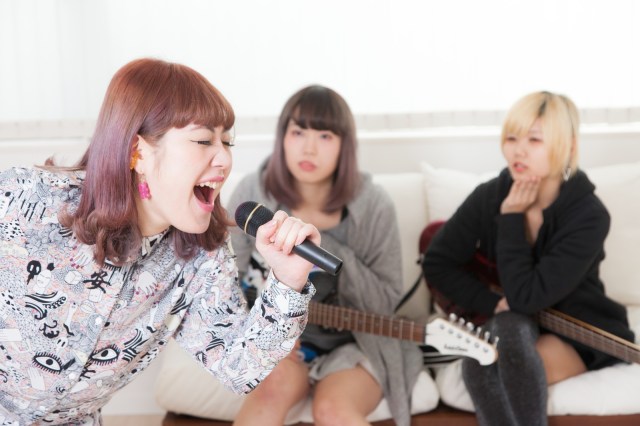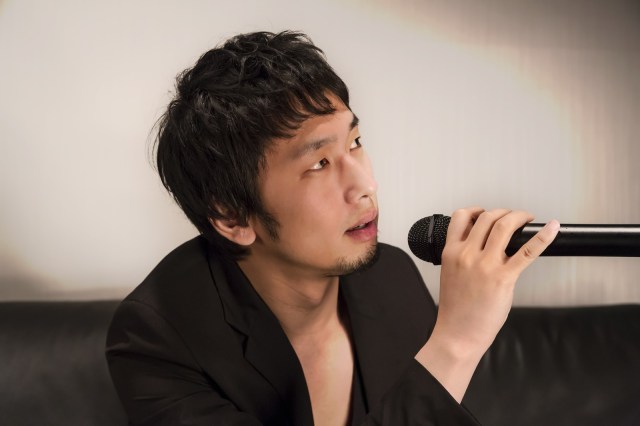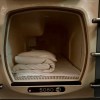
Safety fears and an urge to social distance has rung a death knell for one of Japan’s most famous pastimes.
Spend enough time in Japan and you’ll find yourself in a karaoke booth, whether by your own will or otherwise. Karaoke is such a deeply beloved institution in Japan that it’s possible to find onsen baths equipped with their own machines and Tokyo Dome City even offered patrons the chance to belt out some classics while ascending a Ferris wheel.
Unfortunately, the spread of Covid-19 has put somewhat of a damper on karaoke’s fifty-year successful streak. Since the virus appears to be most easily spread by groups of people talking and yelling in close proximity, people are wisely steering clear of spaces where the entire point is to sit together in a small, questionably-ventilated room so you can all sing your lungs out together. The impact has been undeniable — the JKBA, or Japanese Karaoke Box Association, reports that over 500 karaoke outlets of the 6,000 registered across Japan have already closed due to lack of customers.
▼ Though solo-singing is popular, parties and group outings are where the industry makes its money.
Complicating matters is how businesses were ordered to close to stem the spread of the virus, but many karaoke boxes were still required to pay rent for the buildings they leased. And unlike other businesses that managed to operate within the lockdown, there’s doubt that customers even want to return to karaoke parlors now that they have the green-light to do so.
“This is the most dire situation we’ve faced since karaoke first started up in the 1970s,” one male karaoke box manager commented.
Not everyone is missing the siren call of the karaoke booth, however. Some netizens expressed relief that their friends will stop forcing them to sing in public, while others grumbled at how uncomfortable and inconvenient it is to sing from behind a face mask. Others suggested government funding to bail out existing karaoke boxes, or possibly using the soundproofed spaces for rentals to do less risky activities like watching concert DVDs or practicing musical instruments.
Karaoke is hardly the only cultural staple to have been put in a precarious position by the pandemic, but it’s definitely one of the most sorely felt. Die-hard karaoke fans can at least rest assured that if they really, really need to get their fix, there’s a safe and completely normal-looking way to do so.
Source: Yahoo!Japan News/Asahi Shimbun via Hachima Kikou
Top image: Pakutaso
Insert image: Pakutaso
● Want to hear about SoraNews24’s latest articles as soon as they’re published? Follow us on Facebook and Twitter


 HacoKara Karaoke Box: The best way to de-stress at the cinema in Japan
HacoKara Karaoke Box: The best way to de-stress at the cinema in Japan New COVID-19 delta variant discovered in Japan, believed to be domestically mutated
New COVID-19 delta variant discovered in Japan, believed to be domestically mutated Several McDonald’s branches closing across Japan due to COVID-19 infections
Several McDonald’s branches closing across Japan due to COVID-19 infections Japanese karaoke now offers “Mask Effect” for people with face masks【Video】
Japanese karaoke now offers “Mask Effect” for people with face masks【Video】 Five reasons Japan’s karaoke boxes are great places for group study sessions with your classmates
Five reasons Japan’s karaoke boxes are great places for group study sessions with your classmates Potama serves up epic rice balls like no other, and there’s only one store in Tokyo
Potama serves up epic rice balls like no other, and there’s only one store in Tokyo Tokyo street sweets: The must-snack treats of Nakano’s Refutei
Tokyo street sweets: The must-snack treats of Nakano’s Refutei Drift ice in Japan is a disappearing winter miracle you need to see now
Drift ice in Japan is a disappearing winter miracle you need to see now Can we be just like Shohei Ohtani on a budget with a Hello Kitty cap?
Can we be just like Shohei Ohtani on a budget with a Hello Kitty cap? Anime crime alert – One-of-a-kind anime banner stolen from 72-year-old Tokyo public bath
Anime crime alert – One-of-a-kind anime banner stolen from 72-year-old Tokyo public bath Japan Extreme Budget Travel! A trip from Tokyo to Izumo for just 30,000 yen [Part 2]
Japan Extreme Budget Travel! A trip from Tokyo to Izumo for just 30,000 yen [Part 2] This is Japan’s, and the world’s, first capsule hotel, and you can still stay there
This is Japan’s, and the world’s, first capsule hotel, and you can still stay there Starbucks Japan unveils new Christmas goods, drinkware and candles for the 2025 holiday season
Starbucks Japan unveils new Christmas goods, drinkware and candles for the 2025 holiday season A sad Oden Day in Japan as stores seem to be steadily stopping self-service pots
A sad Oden Day in Japan as stores seem to be steadily stopping self-service pots What’s up with the secret basement at this Japanese train station?
What’s up with the secret basement at this Japanese train station? Starbucks Japan releases first-ever Hinamatsuri Girls’ Day Frappuccino
Starbucks Japan releases first-ever Hinamatsuri Girls’ Day Frappuccino Highest Starbucks in Japan set to open this spring in the Tokyo sky
Highest Starbucks in Japan set to open this spring in the Tokyo sky Tokyo Skytree turns pink for the cherry blossom season
Tokyo Skytree turns pink for the cherry blossom season Japanese restaurant chain serves Dragon Ball donuts and Senzu Beans this spring
Japanese restaurant chain serves Dragon Ball donuts and Senzu Beans this spring Yakuzen ramen restaurant in Tokyo is very different to a yakuza ramen restaurant
Yakuzen ramen restaurant in Tokyo is very different to a yakuza ramen restaurant Japan Extreme Budget Travel! A trip from Tokyo to Izumo for just 30,000 yen [Part 1]
Japan Extreme Budget Travel! A trip from Tokyo to Izumo for just 30,000 yen [Part 1] Japan has only one airport named after a samurai, so let’s check out Kochi Ryoma【Photos】
Japan has only one airport named after a samurai, so let’s check out Kochi Ryoma【Photos】 Japanese drugstore sells onigiri at pre-stupid era prices, but how do they compare to 7-Eleven?
Japanese drugstore sells onigiri at pre-stupid era prices, but how do they compare to 7-Eleven? Burning through cash just to throw things away tops list of headaches when moving house in Japan
Burning through cash just to throw things away tops list of headaches when moving house in Japan Starbucks Japan releases new sakura goods and drinkware for cherry blossom season 2026
Starbucks Japan releases new sakura goods and drinkware for cherry blossom season 2026 Japan’s newest Shinkansen has no seats…or passengers [Video]
Japan’s newest Shinkansen has no seats…or passengers [Video] Foreigners accounting for over 80 percent of off-course skiers needing rescue in Japan’s Hokkaido
Foreigners accounting for over 80 percent of off-course skiers needing rescue in Japan’s Hokkaido Super-salty pizza sends six kids to the hospital in Japan, linguistics blamed
Super-salty pizza sends six kids to the hospital in Japan, linguistics blamed Starbucks Japan unveils new sakura Frappuccino for cherry blossom season 2026
Starbucks Japan unveils new sakura Frappuccino for cherry blossom season 2026 Foreign tourists in Japan will get free Shinkansen tickets to promote regional tourism
Foreign tourists in Japan will get free Shinkansen tickets to promote regional tourism The 10 most annoying things foreign tourists do on Japanese trains, according to locals
The 10 most annoying things foreign tourists do on Japanese trains, according to locals Take a trip to Japan’s Dododo Land, the most irritating place on Earth
Take a trip to Japan’s Dododo Land, the most irritating place on Earth Naruto and Converse team up for new line of shinobi sneakers[Photos]
Naruto and Converse team up for new line of shinobi sneakers[Photos] Is China’s don’t-go-to-Japan warning affecting the lines at a popular Tokyo gyukatsu restaurant?
Is China’s don’t-go-to-Japan warning affecting the lines at a popular Tokyo gyukatsu restaurant? Survey asks foreign tourists what bothered them in Japan, more than half gave same answer
Survey asks foreign tourists what bothered them in Japan, more than half gave same answer Japan’s human washing machines will go on sale to general public, demos to be held in Tokyo
Japan’s human washing machines will go on sale to general public, demos to be held in Tokyo Starbucks Japan releases new drinkware and goods for Valentine’s Day
Starbucks Japan releases new drinkware and goods for Valentine’s Day We deeply regret going into this tunnel on our walk in the mountains of Japan
We deeply regret going into this tunnel on our walk in the mountains of Japan Studio Ghibli releases Kodama forest spirits from Princess Mononoke to light up your home
Studio Ghibli releases Kodama forest spirits from Princess Mononoke to light up your home Major Japanese hotel chain says reservations via overseas booking sites may not be valid
Major Japanese hotel chain says reservations via overseas booking sites may not be valid Put sesame oil in your coffee? Japanese maker says it’s the best way to start your day【Taste test】
Put sesame oil in your coffee? Japanese maker says it’s the best way to start your day【Taste test】 No more using real katana for tourism activities, Japan’s National Police Agency says
No more using real katana for tourism activities, Japan’s National Police Agency says Pokémon anime officially on hiatus due to COVID-19, will only play reruns starting next week
Pokémon anime officially on hiatus due to COVID-19, will only play reruns starting next week Japan’s Eel Pie manufacturing sector hit hard by effects of COVID-19
Japan’s Eel Pie manufacturing sector hit hard by effects of COVID-19